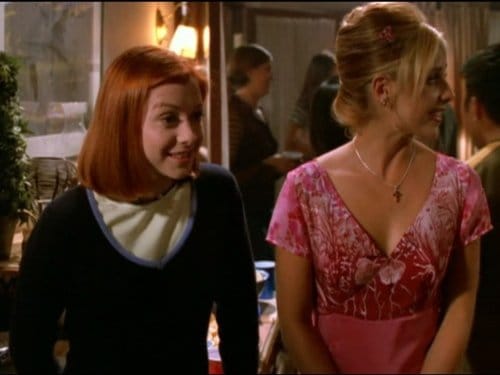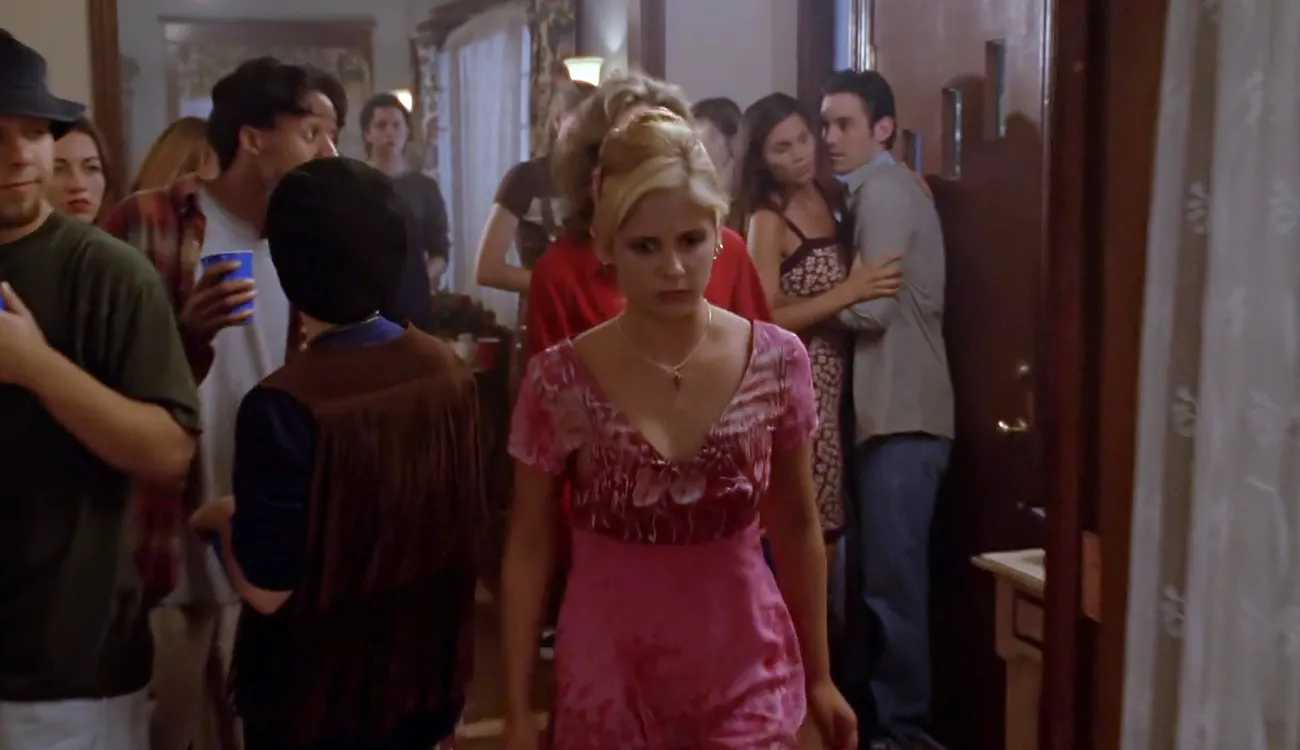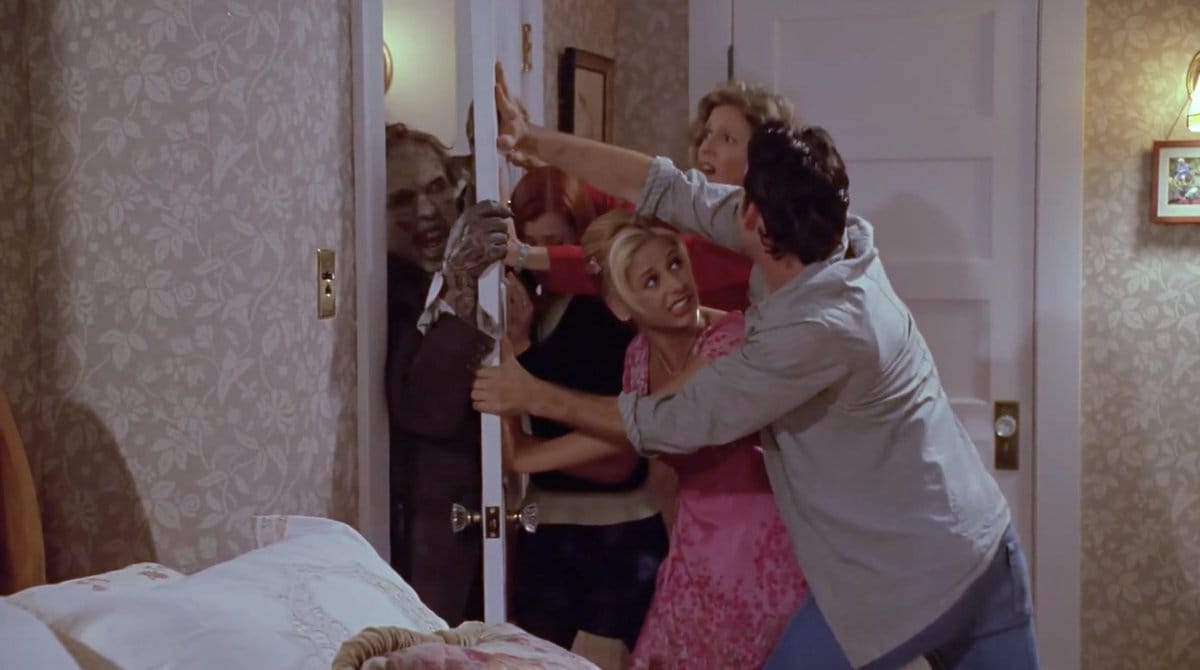Why Willow Got Angry in Buffy- "Dead Man’s Party" and more
The Buffy the Vampire Slayer episode "Dead Man’s Party" is often remembered for the way Willow and Xander seem to unfairly attack Buffy upon her return from Los Angeles.

Unmasking the Unseen: A Deeper Look into the Symbolism of "Dead Man’s Party"

The Buffy the Vampire Slayer episode "Dead Man’s Party" is often remembered for the way Willow and Xander seem to unfairly attack Buffy upon her return from Los Angeles. Initially, it’s easy to sympathize solely with Buffy, who has literally been through hell—both figuratively and literally—after sending Angel to a demonic dimension. Many viewers, myself included, have traditionally seen Willow and Xander as being entirely in the wrong, as Buffy clearly needed time to recover from the immense trauma she endured. However, a more nuanced interpretation of the episode reveals that the characters' harsh behavior is deeply connected to the symbolic power of the Nigerian mask introduced in the episode. The mask, which reanimates the dead, also metaphorically strips away the characters' emotional masks, forcing them to confront and express their long-buried feelings.
Xander’s Line: "You Can’t Bury Stuff, It Always Comes Back to Get You"
Xander's line, "You can't bury stuff, it always comes back to get you," is the theme of the episode.
The Mask as a Symbol of Unmasking Inhibitions
The mask in "Dead Man’s Party" serves as a catalyst for the characters to express thoughts and emotions they’ve been holding back, much like alcohol lowers inhibitions and leads to unfiltered behavior. Until the mask’s influence, Buffy’s friends and family have been maintaining a facade of civility, suppressing their true emotions in the wake of her unexpected departure. The mask’s supernatural power not only brings the dead to life but also resurrects the buried emotions within the group, causing each character to shed their social masks and confront each other with raw honesty—often in exaggerated and distorted ways.

The Unspoken Grievances of Willow, Xander, and Cordelia
Willow, Xander, and Cordelia all struggle with feelings of abandonment and resentment toward Buffy for leaving without explanation. These feelings are compounded by the trauma they endured in the previous season, yet they have been suppressed out of a desire to remain loyal to Buffy and avoid appearing unsupportive during her time of need. The mask’s influence, however, forces these buried emotions to surface in ways that are distorted and intensified.
- Willow is deeply hurt that Buffy did not confide in her or even contact her during her time away. Having nearly died and still recovering from her injuries, Willow feels abandoned by her best friend, whom she believes should have been there for her. Under normal circumstances, Willow might have hidden her hurt out of love for Buffy, but the mask’s influence amplifies her feelings, causing her to lash out more openly eventually advocating for Xander to be violent with her. Before the mask is activated, In the episode Willow only initially touches on Willow’s desire to share about her new relationship with Oz that Buffy's missed out on, yet her deeper grievances—such as Buffy’s absence during her recovery—are only implied, making her frustrations seem less justified to the viewer. This lack of direct communication underscores the distortion caused by the mask, which brings emotions to the surface in ways that lack coherence and context.

- Xander experiences similar feelings of abandonment, but his emotions are further complicated by his unresolved crush on Buffy, his role as her friend, and his own insecurities. Normally, Xander might have kept his frustrations to himself to avoid conflict, but the mask’s power strips away his restraint, leading him to voice his anger directly. However, his expression of these feelings is clouded by his personal biases—such as his longstanding disdain for Angel—which makes it difficult for him to empathize with Buffy’s pain. Instead, Xander’s criticisms come across as dismissive, reflecting his belief that Buffy should be grateful to be back, rather than expecting understanding from the group. His reaction parallels the reanimated cat in the episode—an unappreciated presence that returns unwanted and out of place, much like Xander perceives Buffy’s return.
- Cordelia, while less emotionally attached to Buffy than Willow or Xander, still feels the impact of her departure on the group dynamic. Her usual sharp tongue becomes even more pointed under the mask’s influence, allowing her to express the discomfort she has long felt about Buffy’s supernatural side and its effects on their social world. Unlike the others, Cordelia’s grievances are more superficial, reflecting her discomfort with the social disruption Buffy’s return causes, rather than any deep emotional wound. Yet, the mask’s influence magnifies her usual snark, turning her into a more exaggerated version of herself.
The Symbolism of Oz and Cordelia Emerging from the Closet
The scene where Oz and Cordelia emerge from a closet together without explanation is highly suggestive within the episode's context of suppressed emotions and actions. The closet symbolizes secrecy and hidden truths, and their emergence can be interpreted as a metaphor for revealing something they have been keeping under wraps. While not explicitly explained, the timing of their exit—amidst the chaos caused by the mask’s power—suggests that they might be hiding more than just their physical presence. This moment raises questions about what other feelings or actions are being suppressed, mirroring the episode’s broader theme of hidden truths coming to light. Their emergence from the closet also plays into the theme of unmasking—both literally, in their physical exit, and metaphorically, in what the closet might represent about suppressed emotions or secrets.
Joyce’s Conflicted Emotions and the Weight of Parenthood
Joyce’s line about life being easier without Buffy is particularly significant. As a mother, Joyce is deeply conflicted—she loves her daughter and worries about her constantly, but Buffy’s life as the Slayer brings immense danger and stress into Joyce’s life. The mask’s influence allows Joyce to vocalize feelings she would normally suppress, revealing the part of her that yearned for a simpler, safer existence while Buffy was gone. This moment highlights the complex emotions Joyce experiences as a parent, caught between her love for Buffy and the fear and stress that Buffy’s life choices bring into their family. Her outburst at the party, where she blames Buffy in front of a group of strangers, underscores the extent to which the mask has stripped away her ability to maintain a supportive facade, exposing her deepest fears and regrets.

Giles’ Cultural Frustrations and Hidden Resentments
Giles, typically reserved and diplomatic, lets slip a comment about Americans being dumb, which aligns with his often-frustrated perspective as a British Watcher in a very different culture. Normally, Giles would suppress these thoughts to maintain harmony within the group, especially given how much he values his connections with them. However, the mask’s influence loosens his tongue, allowing him to express irritations that have been building since his traumatic encounter with Drusilla. This outburst is not merely a cultural criticism but a reflection of the accumulated frustrations that Giles has been suppressing, exacerbated by the trauma he has endured.
Xander’s Line: "You Can’t Bury Stuff, It Always Comes Back to Get You"
Xander's line, "You can't bury stuff, it always comes back to get you," directly reflects the episode's central theme. All the characters have been burying their emotions, trying to maintain normalcy despite the unresolved issues between them. The mask, by bringing the undead to life, serves as a metaphor for how these buried feelings will always resurface, often with destructive consequences. Just as the dead rise to attack, the characters’ repressed emotions come back to "get" them, leading to confrontations and the airing of grievances they have been avoiding. This literal and figurative resurrection of buried issues underscores the danger of suppression, illustrating that unresolved trauma and emotions will inevitably find a way to the surface, often in unpredictable and damaging ways.
Conclusion
The mask in "Dead Man’s Party" serves as a potent symbol of unmasking and the consequences of suppression. It forces the characters to confront the feelings they have buried, much like alcohol might strip away inhibitions, leading to unfiltered expressions of their deepest frustrations, fears, and resentments. The episode highlights the dangers of burying emotions, as these suppressed feelings, like the undead, will eventually rise and demand to be dealt with, no matter how much the characters try to avoid them. The resulting confrontations, though exaggerated by the mask’s power, reflect the very real human experience of how unresolved trauma and suppressed emotions can distort relationships and lead to destructive outcomes when finally unleashed. In this light, the characters' behavior, while unsettling, becomes more understandable as a manifestation of the unresolved pain and tension that the mask forces them to confront, ultimately serving as a reminder that emotions, like the undead, cannot be buried forever.
Pat’s Influence on Joyce: The Projection and Closeting Metaphor
Joyce’s behavior in "Dead Man’s Party" is not just about the stress of dealing with Buffy’s return—it also reflects deeper, more personal struggles that have been brewing beneath the surface. Pat’s presence in Joyce’s life offers a glimpse into these struggles, suggesting that Joyce’s feelings of relief during Buffy’s absence were tied to more than just the absence of Slayer-related chaos. The mask’s influence reveals the complicated dynamics at play, particularly in how Joyce projects her own emotional turmoil onto Buffy.
- Joyce’s Temporary Stabilization: With Buffy gone, Joyce may have experienced a temporary sense of stability, not just because of the reduced danger in her life, but also because of the freedom it afforded her to explore her relationship with Pat. Whether Pat and Joyce’s relationship was romantic or simply a close friendship, Pat provided Joyce with emotional support that Buffy’s presence—along with the Slayer world—often disrupted.
- The mask amplifies Joyce’s feelings of guilt over this, bringing them to the forefront and causing her to lash out at Buffy, not just for leaving, but for returning and disrupting the fragile normalcy Joyce had briefly enjoyed.
- The Closeting Metaphor: Buffy’s revelation as the Slayer can be read as a metaphor for coming out of the closet, especially in the context of Sunnydale’s conservative, suburban environment. Joyce’s initial reaction to Buffy’s "coming out" as the Slayer was one of fear, rejection, and confusion—common reactions for parents struggling to accept their children’s hidden identities.
- Joyce herself may have been grappling with her own emotional truth regarding her relationship with Pat, and the strain of hiding this relationship may have compounded her stress when dealing with Buffy’s secret life. The mask’s influence forces Joyce to confront these feelings, leading to her outburst about life being "better" without Buffy—a statement that reflects not only her fear of the dangers Buffy brings but also her resentment at being forced back into the closet, metaphorically speaking.
- Projecting onto Buffy: Joyce’s projection of her frustrations onto Buffy is a key element of the episode’s deeper themes. Without Buffy, Joyce was able to live more openly with Pat, whatever the nature of their relationship may have been. Buffy’s return, and the re-emergence of her Slayer identity, disrupted this sense of normalcy, forcing Joyce to suppress her own desires and needs once again. The mask’s power strips away the layers of civility Joyce has built up, exposing the raw emotions she has been trying to keep hidden, not just from Buffy, but from herself.
- If Joyce was romantically involved with Pat, it’s plausible that Pat could have projected her own opinions or feelings about Buffy onto Joyce. Pat’s more domineering and judgmental nature could have given Joyce the courage or, at the very least, the influence to say hurtful things she normally wouldn’t express.
- Pat may have been uncomfortable with Buffy's presence, either because of the Slayer-related chaos or even jealousy that Buffy's return threatened the intimate dynamic between Joyce and Pat. Pat’s line about Joyce being "better off" without Buffy, even indirectly, might have seeped into Joyce’s subconscious, leading her to vocalize thoughts she didn’t fully mean but had been encouraged to feel.
- Joyce's Guilt and Conflict About Being 'Better' Without Buffy
When Joyce comments about things being "better" when Buffy was gone, it could reflect a guilt-ridden admission of how her life temporarily stabilized during Buffy’s absence. With Buffy gone, Joyce might have had the freedom to explore her relationship with Pat more openly, without the constant Slayer-related chaos. Pat, a figure of stability and perhaps romantic involvement, provided Joyce with a sense of emotional security that Buffy’s presence—along with the dangerous Slayer world—threatened.
Joyce’s words about being "better" without Buffy may not have been about not loving or worrying about her daughter, but rather an expression of how different her life felt during Buffy’s absence, especially if her relationship with Pat was blossoming during that time. The guilt of feeling a temporary sense of ease, or even happiness, without Buffy could have led Joyce to say hurtful things in moments of emotional distress, especially influenced by Pat’s own critical perspective.
Giles’ Guilt as a Watcher: While Giles expresses his frustration with American culture under the mask’s influence, this outburst also hints at his deeper guilt as Buffy’s Watcher. He feels responsible for the trauma she has endured and the choices she has been forced to make—choices that have isolated her from the very people who should be supporting her. The mask amplifies Giles’ internal conflict, revealing that his criticism of Americans is partly a projection of his own feelings of inadequacy and failure in his role as her protector.
Xander’s Unacknowledged Leadership: Xander, who has always struggled with feelings of inadequacy compared to his supernaturally gifted friends, found a sense of purpose during Buffy’s absence. The mask amplifies his resentment towards Buffy, not just because she left them, but because her return threatens to push him back into a supporting role. His harsh words toward Buffy are fueled by this fear of becoming irrelevant again—a fear that he doesn’t fully acknowledge, even to himself.


Comments ()